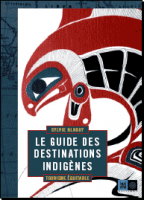This is a message from Sylvie
Since I gave a presentation at Carleton University on January 18, I have had a lot of request from students interested in using web based surveys for their collaborative enquiry or their Delphi consultation
Have you had a chance to use Web based and on line questionnaires in the past and could you share your experience with us ?

Dana Sallouha, an undergrad student from the Geography Department is using Limesurvey http://www.limesurvey.org for her inquiry on Code of ethics for aboriginal tourism and she will report to us later. The survey is about to be mailed to the authors who have expressed an interest in being involved in her research project. Please, see Dana’s page for her research project.

I am copying here an extract of Holly’s Donohoe’s text, explaining why and how she used Surveymonkey http://www.surveymonkey.com for her Delphi survey
Holly’s note below :
Internet-based Surveys for Delphi Administration
Holly Donohoe, Department of Geography and Environmental Studies, University of Ottawa
The Delphi technique is a qualitative survey method that is used to capture and combine expert knowledge to arrive at an informed group consensus on a complex problem. The technique relies on a series of sequential surveys, thus a substantial time commitment is required by both researchers and participants. Slow communication mediums (e.g. ground mail), late responses, and data synthesis and analysis, may force additional time requirements for Delphi administration. Consequently, time is a methodological disadvantage for which mitigation measures are required.
The Internet is providing a new and increasingly important medium for both qualitative and quantitative research. It is an interactive medium that facilitates communications between individuals and it has evolved “to include a vast cyber-network or virtual community of opportunities and information” (Donohoe and Needham, 2008 : 16). As an alternative to the traditional ‘pen and paper’ survey method, Internet-based surveys offer Delphi administrators a unique and rapid medium for communicating with participants. For example, during the recruitment phase, Internet-based methods can facilitate knowledge exchange with a global network of potential participants. A large sample may be accessed and recruitment costs (postage, travel, etc.) and time may be reduced. During the data collection and analysis phase, Internet-based methods can facilitate rapid and easy communications, such as the delivery of surveys and survey deadline reminders, as messages are immediately delivered to the recipients. Internet-based surveys can also provide administrators with a timely method for collecting and analyzing data. Responses can be tracked, response rates can be calculated, participation can be maximized, data entry task can be minimized (data is automatically entered into a spreadsheet), and data can be pooled with ease.
But, having said this, the use of Internet-based Delphi surveys is a relatively new phenomenon.
Exploratory research is needed to better understand its potential benefits. In planning for my own Delphi research, a traditional ‘pen and paper’ method was originally chosen for survey administration. However, after defining the participation requirements for the research (approximately 150 experts from a diversity of global locations), reviewing the project’s data and information needs, and consulting with colleagues, it became evident that time presented a barrier to Delphi administration. Accordingly, the decision was made to replace the traditional survey with the Internet-based survey so as to take advantage of its’ time saving benefits.
SurveyMonkey.com, was used to design and administer the Internet-based survey. It was selected because it offers a user-friendly interface (for both researchers and participants), the researcher is afforded complete creative control, a participant database can be created and used to manage communications, the data is secure stored (encrypted), responses are viewable immediately, no data entry is required (beyond participant contact information), a summary of the results is available in a variety of formats (spreadsheets, pooled data, etc.), and the tool was reasonably priced (free with option to upgrade for minimal monthly fee).
The most attractive feature of this Internet-based survey interface is the ability to create and share custom summary reports with participants at any time during the Delphi exercise. As knowledge sharing is a key feature of the Delphi and access to results is one of the key benefits for participants, this feature was a key consideration when selecting SurveyMonkey.com as the Internet-based survey interface. A Google map was also created to compliment and build on the survey process.
This Internet-based mapping interface is used to display the participant’s locations and their realm of expertise (academic, professional, or both). Locations are identified on the map with a coloured marker. As Delphi is an anonymous process, the map offers participants information about other research participants without revealing their identity. For the researcher, the map offers a means for visualizing and evaluating the global participant distribution (an important component of the research). During the research process, the map and its content is managed by the researcher. Once the research is complete, the ambition is to make the map interactive so that participants can reconvene. Participants will be able to post information about their products, services, and activities. They may link with other experts to generate ideas, exchange resources, and/or discuss research outcomes. The map is to serve as a meeting place and a nexus for knowledge exchange. The research is currently in the data collection phase. Once the research is complete, the utility of Internet-based surveys for Delphi administration is to be comprehensively reviewed in a forthcoming paper.
Donohoe, H. and Needham, R.D. (2008) Internet-Based Ecotourism Marketing : Evaluating Canadian Sensitivity to Ecotourism Tenets. Journal of Ecotourism, 7(1) : 15-43.
Holly’s web site http://www.geography.uottawa.ca/


